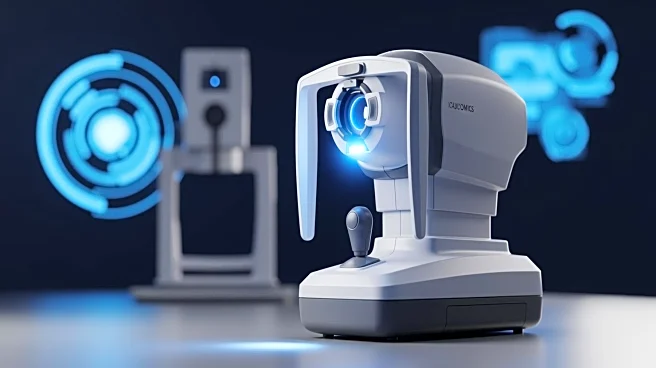What's Happening?
Oculomics, a new field leveraging AI and high-resolution retinal imaging, is transforming eye scans into comprehensive health checks. This technology allows for the detection of systemic diseases such as heart disease, diabetes, kidney issues, and neurological
disorders through noninvasive eye exams. The retina, sharing blood vessels with vital organs, can reveal subtle changes indicative of broader health issues. AI algorithms analyze retinal images to detect patterns that are imperceptible to the human eye, creating a 'digital eyeprint' that reflects overall health. This approach is supported by large datasets like the UK Biobank, enhancing the accuracy and scope of health predictions.
Why It's Important?
The development of oculomics represents a significant advancement in preventive healthcare, offering a low-cost, noninvasive method for early disease detection. By identifying health risks through eye scans, this technology could lead to earlier interventions, reducing the burden on healthcare systems and improving patient outcomes. It also exemplifies the potential of AI in medical diagnostics, paving the way for more personalized and precise healthcare solutions. The ability to detect diseases early could transform patient care, shifting the focus from treatment to prevention.
What's Next?
As oculomics technology continues to evolve, it may become a standard part of routine health checks, integrated into primary care settings. Further research and development could expand its application to more diseases, enhancing its diagnostic capabilities. Regulatory approval for autonomous AI tools in healthcare could accelerate its adoption, making advanced diagnostics more accessible. The success of oculomics may also inspire similar innovations in other areas of medical imaging and diagnostics.
Beyond the Headlines
The widespread use of AI in healthcare raises important ethical and privacy concerns. Ensuring the security of sensitive health data and maintaining patient confidentiality are critical challenges that must be addressed. Additionally, the reliance on AI for diagnostics necessitates rigorous validation and oversight to prevent errors and ensure reliability. The integration of AI into healthcare also highlights the need for equitable access to advanced technologies, preventing disparities in health outcomes.
















